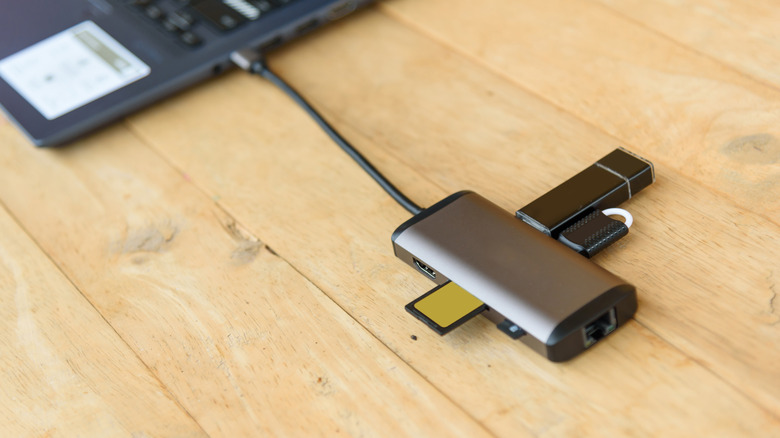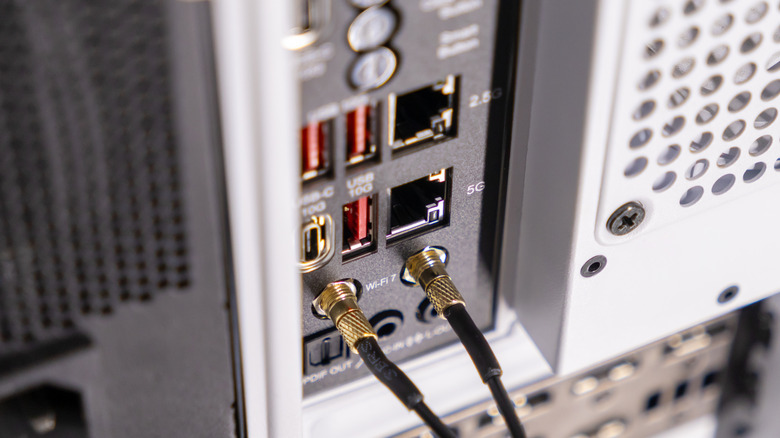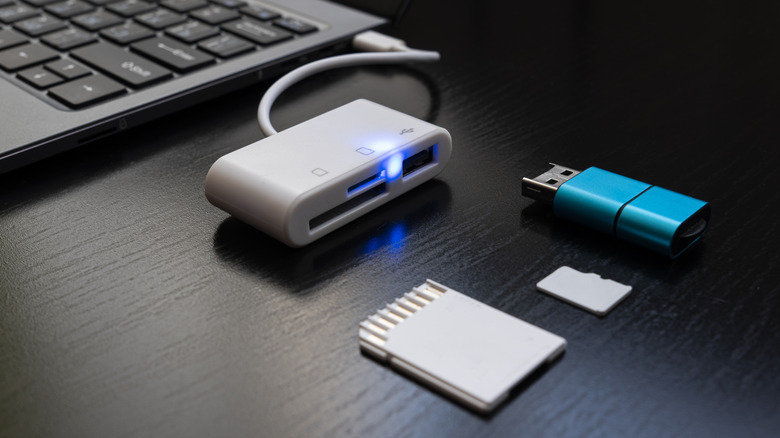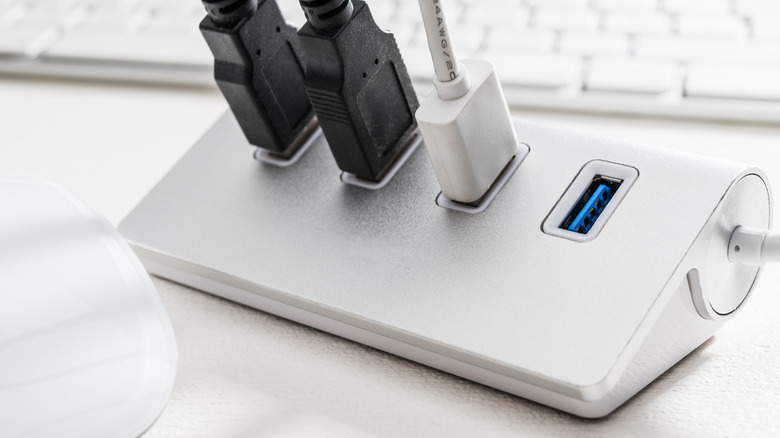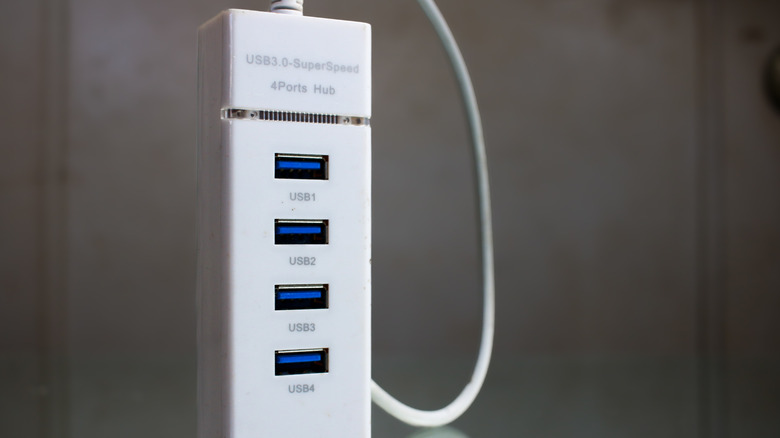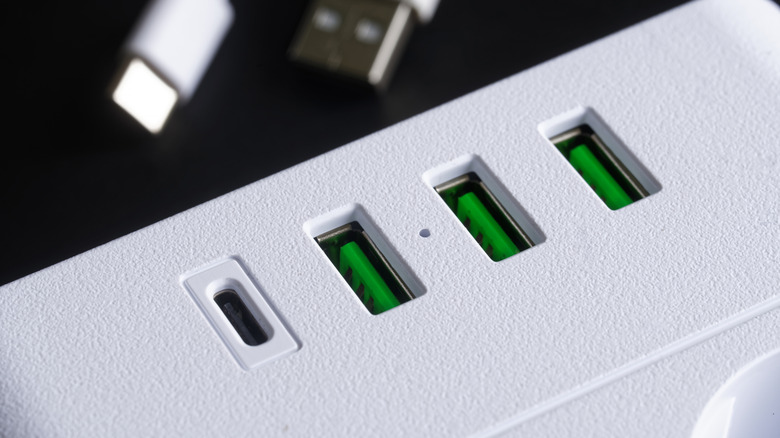5 Reasons Why You Need To Invest In A USB-C Dock If You Have A PC
We may receive a commission on purchases made from links.
The primary benefit of a USB dock or hub is pretty easy to see. Even with something cheap like Anker's 5-in-1 USB-C Hub, you can easily increase the number of USB ports on your computer, letting you connect more devices at once. On laptops and phones with limited ports, having one of these is vital if you rely on flash drives or external storage. But the best docking stations you can buy for your laptop aren't quite as useful if you have a full-sized PC with plenty of ports already.
Computers will often have a wider variety of ports available than smaller pieces of tech. A premium laptop can't support nearly as many connections as a budget PC tower, even if the latter doesn't have quite as much USB-C compatibility. Despite this, even if you already have as many USB connections as you could want, there are still some benefits to using a USB-C dock. Although many of those benefits are situational, you might be surprised about what these gadgets can do for you.
A USB hub can unlock extra bandwidth
Motherboards might come with a wide variety of ports, but not all of these connections are created equal. The X870E AORUS Elite is a prime example of this disparity, with some ports running on 3.2 speeds and others stuck at 2.0 speeds. In case you don't know what every USB port symbol and icon might mean, this basically forces you to deal with slower transfer speeds if you use up the faster ports. Where the usefulness of a dock comes in is with the type-C connectors, which support faster USB4 speeds.
While this feature isn't universal, most USB-C ports tend to support faster speeds than type A or B ports. Docks like the Amazon Basics USB4 Docking Station can make use of these speeds with multiple devices at once. This way, you don't have to ration out each port just to make sure your data is being read or transferred as fast as possible. For anyone living a fast-paced life, making full use of faster transfers is a vital task that can only be truly achieved with the help of USB-C docks.
USB hubs expand your compatibility options
Modern PC cases tend to rely more on aesthetics and airflow instead of accessibility. This often leaves them without many front-panel ports, usually only offering enough for a couple of type-A USB connections. The benefit of a dock really goes without saying in this case, as it can support additional form factors like SD cards. You'll be hard-pressed to find any PC that supports that without being really old or provided directly by the manufacturers.
SD Cards are just one example of a port that might be in short supply on PCs, with other docks also supporting HDMI and ethernet ports. Additionally, you don't need to sacrifice any of your existing ports just to have this compatibility. Anker's 7-in-1 USB-C Hub includes slots for SD cards, HDMI, and multiple type-A connections, but it still has a port where it can read data from other USB-C devices. The most you might have to worry about is a slightly reduced transfer speed, but as you're likely well-aware by now, that isn't going to be an issue for most type-C connections.
USB-C hubs let you plug more in
One understated problem with USB devices is how variable they are in terms of size. Some of the best SD card readers are simple USB sticks that have the card sticking out of the side, which can actually cause clearance issues in some PC cases. Certain models will have the USB ports stacked right next to each other, which can lead to the SD cards in these adapters blocking the way for other devices to plug in. The devices might also just be too big on their own, with Anker's 2-in-1 SD Card Reader having a very robust shape and potentially keeping you from plugging in an extra flash drive.
This issue becomes much less relevant with USB-C docks. While some might still have their ports a bit too close to each other, the simple fact that they have so many ports makes it easy to compensate. In other words, you don't have to keep unplugging larger devices to make room for smaller ones. It provides an extra bit of convenience that you wouldn't be able to get from the design of most PC towers out there.
USB hubs give you quick access to your ports
It's entirely possible that you have every port you'd ever need on your computer, but that doesn't mean you'd have easy access to them. Unlike laptops, a full-sized PC tower isn't very mobile, which can make its rear ports difficult to access if you keep it under your desk or next to a wall. Some docks aren't able to resolve this issue due to their cables being short and non-removable. Others — like the Anker 10-in-1 hub — include a dedicated port that allows you to use as long of a cable as you like, which can allow the dock to sit right within arm's reach.
This benefit mostly depends on both your computer's location and the location of its ports. Obviously, it's not going to be as useful if everything is already accessible with just a stretch of your hand. But users who plug a lot of USB devices into their PC often will certainly appreciate the comfort of having a dock right next to them. Combined with the usually faster speed of USB-C ports, you can plug in just about any type-A flash drive without any sort of speed loss without needing to reach over to your motherboard.
The USB-C ports on USB hubs are easier to connect to
If you have no clue what USB Type C even is, this final benefit might come as a surprise to you. Unlike USB-A plugs, which include an internal tab that forces them to be inserted in one specific way, USB-C plugs don't have an orientation. This is an extra, minor bonus to getting this sort of dock instead of one that connects with a type A plug. Simply put, you don't really need to worry about how you plug a USB-C hub into your computer.
While it might not seem like there's much benefit to the hub itself connecting using a type C cable, it's still worthwhile due to their portability. Most of these docks are exceptionally portable, allowing you to take them on trips even if you have to leave the rest of your PC behind. Being able to quickly plug into any other PC and access your data can make a huge difference if you're in a hurry, like if there's an important document you need for a meeting. Simply turning your USB stick the right way isn't the most taxing thing to do, but using a dock with a more versatile connector can still save you from a lot of added frustration.
